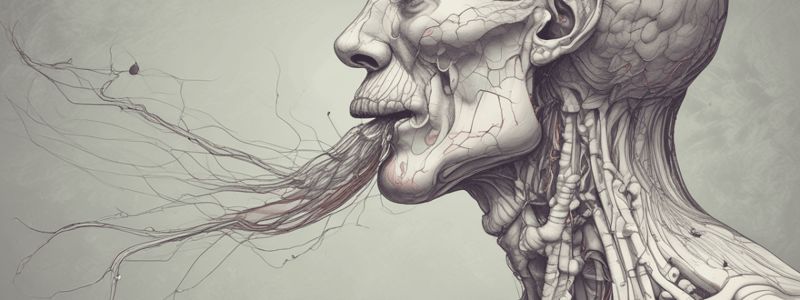Podcast
Questions and Answers
Which of the following nerves is NOT involved in the swallowing mechanism?
Which of the following nerves is NOT involved in the swallowing mechanism?
- Hypoglossal
- Vagus
- Palatoglossus
- Trochlear (correct)
What is the primary function of the palatopharyngeus muscle during the oral phase of swallowing?
What is the primary function of the palatopharyngeus muscle during the oral phase of swallowing?
- Relaxation of the upper esophageal sphincter
- Lateral movement of the pharynx to facilitate food passage
- Elevation of the soft palate to close the nasopharynx (correct)
- Constriction of the pharynx to propel the bolus
Which of the following is a complication of dysphagia?
Which of the following is a complication of dysphagia?
- Otitis media
- Gastroesophageal reflux disease
- Aspiration pneumonia (correct)
- Dental caries
What is the role of the mucus layer in the esophagus during swallowing?
What is the role of the mucus layer in the esophagus during swallowing?
Which of the following muscles is involved in the esophageal phase of swallowing?
Which of the following muscles is involved in the esophageal phase of swallowing?
What is the function of Waldeyer's ring?
What is the function of Waldeyer's ring?
Which of the following cranial nerves can be damaged, leading to dysphagia?
Which of the following cranial nerves can be damaged, leading to dysphagia?
During the pharyngeal phase of swallowing, which muscles contract sequentially to propel the food bolus into the oesophagus?
During the pharyngeal phase of swallowing, which muscles contract sequentially to propel the food bolus into the oesophagus?
What is the term for the sensation of a lump in the throat?
What is the term for the sensation of a lump in the throat?
In which phase of swallowing do the pharyngeal muscles elevate the larynx and widen the pharynx?
In which phase of swallowing do the pharyngeal muscles elevate the larynx and widen the pharynx?
Which of the following is an example of a painful condition that can cause dysphagia in the oropharyngeal part?
Which of the following is an example of a painful condition that can cause dysphagia in the oropharyngeal part?
What is the term for the reflux of stomach content into the pharynx?
What is the term for the reflux of stomach content into the pharynx?
Which of the following is a cause of dysphagia due to a motility disorder?
Which of the following is a cause of dysphagia due to a motility disorder?
What is the name of the syndrome characterized by a tear in the lining of the esophagus, which can cause dysphagia?
What is the name of the syndrome characterized by a tear in the lining of the esophagus, which can cause dysphagia?
Which of the following muscle groups is responsible for the oral phase of swallowing?
Which of the following muscle groups is responsible for the oral phase of swallowing?
A retrosternal goitre can cause dysphagia by?
A retrosternal goitre can cause dysphagia by?
What is the term for the passage of food from the esophagus back into the pharynx?
What is the term for the passage of food from the esophagus back into the pharynx?
Which of the following is a symptom of dysphagia?
Which of the following is a symptom of dysphagia?
What is the name of the surgical procedure that can cause dysphagia due to scarring in the neck?
What is the name of the surgical procedure that can cause dysphagia due to scarring in the neck?
What is the term for the abnormal passage of food into the nasal cavity during swallowing?
What is the term for the abnormal passage of food into the nasal cavity during swallowing?
Flashcards are hidden until you start studying
Study Notes
Swallowing
- It is a process in which food and liquid pass from the back of the mouth to the stomach
- It is an “all-or-nothing” reflex, initiated voluntarily but once started, it cannot be stopped
- Normal swallowing can be divided into three stages: oral, pharyngeal, and oesophageal
Oral Stage
- Involves the lips, teeth, cheeks, tongue, and soft palate
- The tongue and oral cavity components push the food to the back towards the oropharynx and oesophagus
- Palatoglossus and palatopharyngeus muscles have a role in swallowing
Pharyngeal Stage
- Nervous initiation of the pharyngeal stage occurs in the ring around the pharyngeal opening, with greatest sensitivity on the tonsillar pillars
- Involves the tongue, soft palate, vocal cords, epiglottis, hyoid bone, and larynx
- Pharyngeal muscles (longitudinal and circular) help to elevate the larynx, shorten and widen the pharynx, and propel the food bolus into the oesophagus
Oesophageal Stage
- Involves a wave of peristalsis that sweeps down the oesophagus, propelling the bolus to the stomach in about 9 seconds
- Mucus layer helps in the movement of the bolus during peristalsis
Dysphagia
- Definition: difficulty in swallowing
- Should be differentiated from odynophagia, globus, phagophobia, regurgitation, and gagging
- Causes can be divided into oral, pharyngeal, and oesophageal parts
- Symptoms include difficulty chewing, initiating swallow, nasal regurgitation, coughing, and regurgitation
Oropharyngeal Causes
- Painful conditions: acute tonsillitis, glandular fever, acute pharyngolaryngeal oedema, Ludwig's angina
- Neurological conditions: cranial nerves (3rd division of 5th, 7th, 9th, 10th, 11th, 12th) damage, multiple sclerosis, muscular dystrophy, or Parkinson's disease
Oesophageal Causes
- In the lumen: foreign body, drugs, gastroesophageal reflux
- In the wall: sideropenic dysphagia, inflammation, tumour, motility disorders, Mallory-Weiss syndrome, iatrogenic
- From outside of oesophagus: rolling hiatus hernia, retrosternal goitre, any mass in the chest
Studying That Suits You
Use AI to generate personalized quizzes and flashcards to suit your learning preferences.




